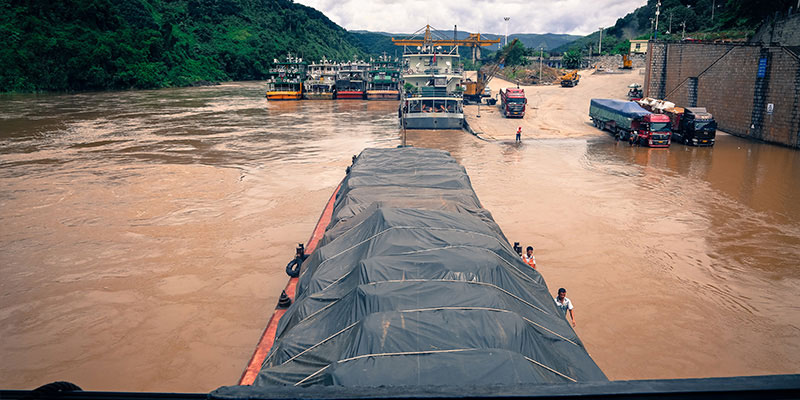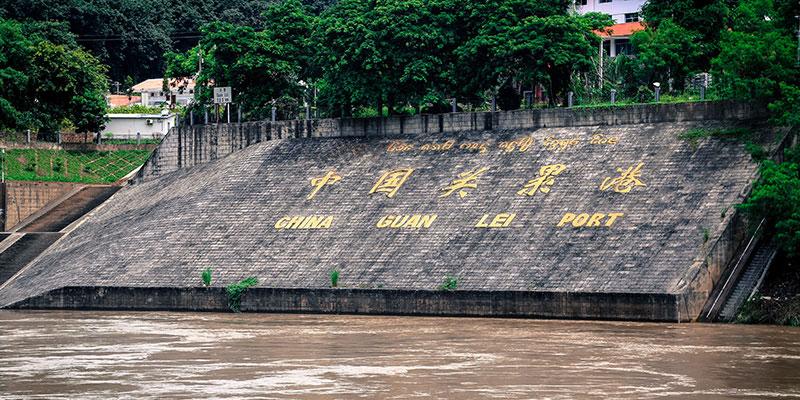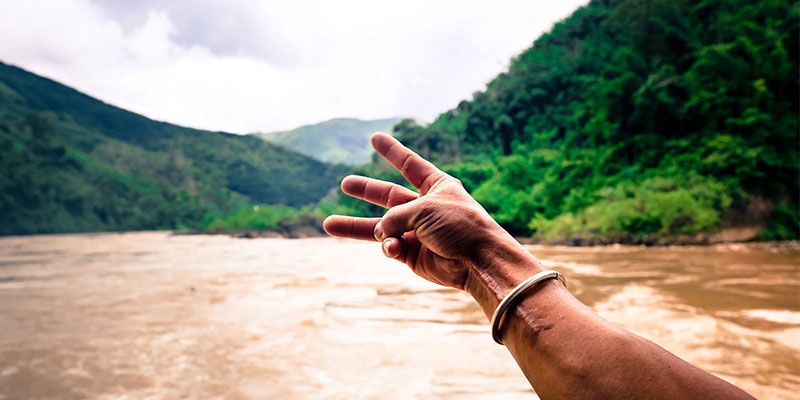A Dangerous Corner of the Mekong
Chinese trade expands here, where China, Myanmar, and Laos meet.
Location: Golden Triangle
The Chinese freighter casts off from the Guan Lei wharf and heads into the Mekong in the Golden Triangle. Here the river is less about people and stories, and more about a torrent of conflicts and secrets.
The captain and first mate will stay together in the wheelhouse for the entire nine or 10 hour trip, carefully picking their way through the hidden jaws of the river.
We’re carrying Chinese goods to Thailand and beyond through one of the most dangerous parts of a growing Chinese trade zone.
I’m traveling with a small Chinese crew of only four men. An hour out of port, the cook points to a rusted metal pole set high up on a large boulder. He explains that this is the tri-point border junction where China, Myanmar, and Laos meet. It’s a lonely place. Here the river sheds one name, the Lancang Jiang, and adopts another, the Nam Khong, or "Mother River."
On the eastern bank is Laos. To the west is the Shan State in Myanmar, where tribal wars still blur the lines on the map. On that bank there’s almost no sign of human habitation.
Later, in the relative safety of northern Thailand, I meet with an ethnic politician active inside Shan State. She confirms my first impression: "The people in Shan State don’t live near the river for fear of drug gangs," she says. Wracked by conflict and drugs, Shan State remains a sparsely populated jungle, with limited access by dirt tracks.
In Shan State, Myanmar’s recent "opening up" to the outside world hasn’t quelled one of the world’s longest-running civil wars. Ethnic armies shift allegiances and swap arms, while a conflict against the Burmese army, the Tatmadaw, simmers, fueled by drugs and crime.
The Burmese Army inflicts a "scorched-earth tactic" on many of the local villagers, a policy that amounts to a war crime. High-level Burmese military officers appear to encourage it. Under this punitive tactic, some in the military take all of the food and kill all of the animals.
People trapped between armies
The ethnic political leader explains that the local people are trapped between opposing armies, all supported by trafficking crimes and the drug trade.
"One day it will be Burmese soldiers and the next the Shan State Army," she says. "The conflicts are complicated by contests among drug lords to buy loyalty from one side or the other. The use of child soldiers is universal. By nine or ten years of age children are kidnapped, or even volunteer. As soon as they can carry a gun, children fight, without shoes or clothes, but they have guns."
"The people in Shan State don’t live near the river for fear of drug gangs."
-Ethnic Politician
As a result of the conflict, social development remains stagnant. Poverty is high and education is very low. There are few hospitals and medicine is scarce in many places. Child mortality is high, and children regularly have babies before they are even out of puberty.
At the same time, as Myanmar has opened to the outside world, new pathways have been opened for trafficking people and narcotics. Young women from impoverished villages are lured to China to meet the demand for wives arising from decades of the One-Child Policy.
The only option for many indigenous people is to flee across the border into Thailand for fear of being forced into servitude by one army or another. Once in Thailand, many Shan women end up as prostitutes.
The sheer and forested riverbank gives no signs of these troubles. I go up to the wheelhouse where the captain and first mate pilot the ship. It’s a two-man job: the captain manning the throttle while the mate manoeuvres past giant submerged rocks, nearly close enough to touch.
The military, drug lords, smugglers, and casinos prevail
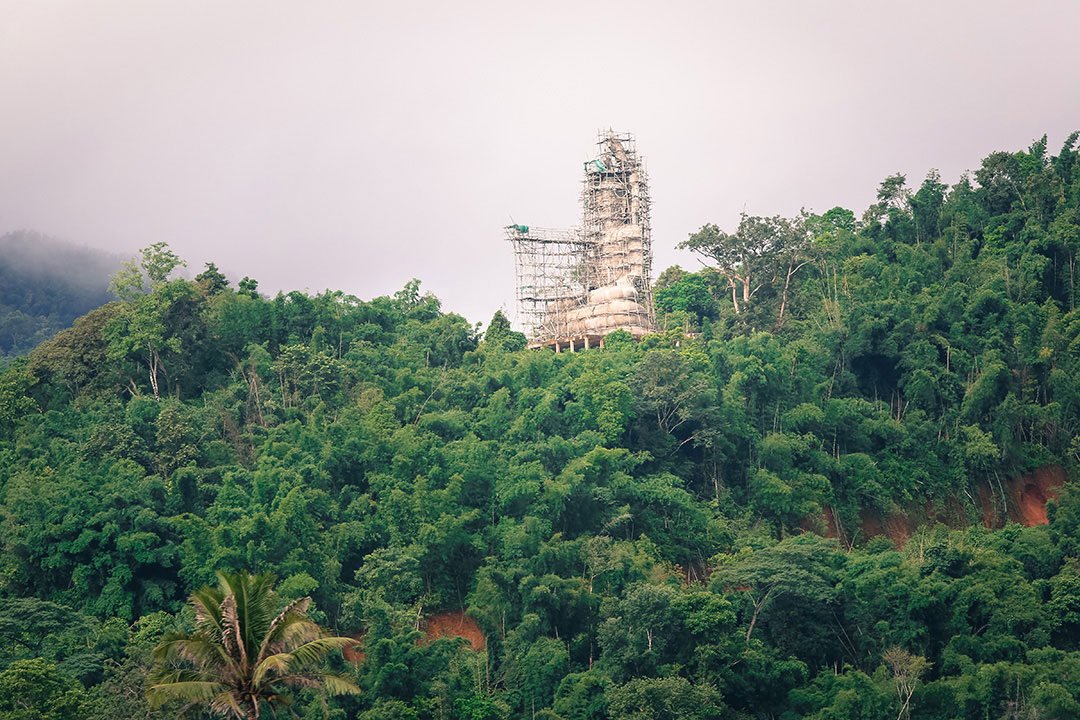 We moor overnight beside a Laotian village and continue our journey
at sunrise the next day. When the Golden Triangle draws near, we
pass a Tatmadaw army base on the Myanmar bank. The soldiers start
gesturing excitedly, motioning for us to come closer. We steam on.
The first mate brings me upstairs into the wheelhouse. There the
captain mimes firing a machine gun and points to the western bank.
We’re passing the site of the "Mekong Tragedy" where in 2012 a local
drug lord murdered 13 Chinese crewmen who were traveling on two
freighters.
We moor overnight beside a Laotian village and continue our journey
at sunrise the next day. When the Golden Triangle draws near, we
pass a Tatmadaw army base on the Myanmar bank. The soldiers start
gesturing excitedly, motioning for us to come closer. We steam on.
The first mate brings me upstairs into the wheelhouse. There the
captain mimes firing a machine gun and points to the western bank.
We’re passing the site of the "Mekong Tragedy" where in 2012 a local
drug lord murdered 13 Chinese crewmen who were traveling on two
freighters.
Nearby, an unmarked large white compound commands the wide floodplain, where the signs of wealth include a host of golden spires and immense Buddha statues. It is the only significant settlement since leaving China and seems mysterious, bristling with satellite dishes and radar antennas, but no flags or military or government markings. On the opposite bank is a large Laotian patrol boat. Around the corner in the distance is Chiang Saen, Thailand. This is the Golden Triangle today, a triumvirate of the military, narcotics smugglers, and casinos.
The ethnic politician with whom I spoke claimed that inside Shan State there are four main industries: casinos, narcotics production, precious timber exports, and rare jewel smuggling. The income from Ya Ba, which is a mixture of caffeine and mephamphetamine, and the casinos are inextricably linked. All of these industries are illicit, and all run with the knowledge of the police. She suggested that the local police forces in each nation work together moving goods.
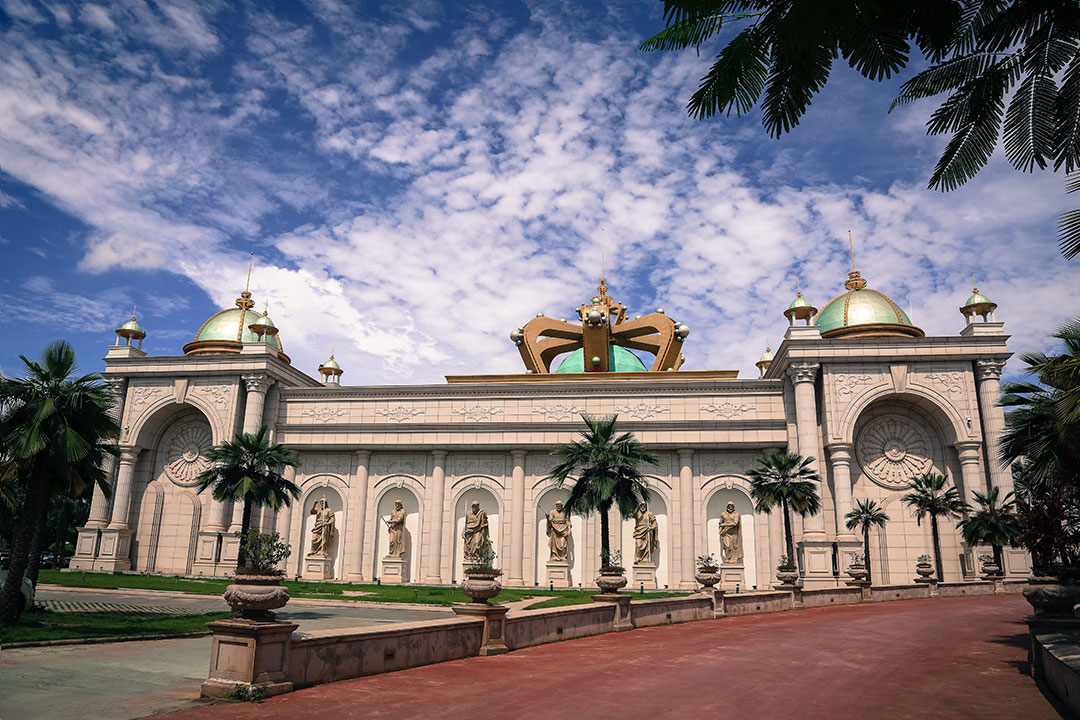 The next day I catch a ferry to the Kings Romans casino in Laos. The
casino is at the center of a special economic zone, and the signs of
Chinese economic power are everywhere. I meet a group of Chinese men
entertaining Laotian lady boys over lunch. They explain that the men
own a large banana plantation downstream. Inside the casino, I
wander through the gaming halls, staring into the largest, where
everyday gamblers play a game called dragons and tigers. The
500-year-old indigenous village that existed on these lands before
the government designated it a "Special Economic Zone" is long gone.
Now new people from Yunnan Province in China and the Laotian capital
of Vientiane run almost all of the new businesses.
The next day I catch a ferry to the Kings Romans casino in Laos. The
casino is at the center of a special economic zone, and the signs of
Chinese economic power are everywhere. I meet a group of Chinese men
entertaining Laotian lady boys over lunch. They explain that the men
own a large banana plantation downstream. Inside the casino, I
wander through the gaming halls, staring into the largest, where
everyday gamblers play a game called dragons and tigers. The
500-year-old indigenous village that existed on these lands before
the government designated it a "Special Economic Zone" is long gone.
Now new people from Yunnan Province in China and the Laotian capital
of Vientiane run almost all of the new businesses.
I return to the Thai shore, and head downstream to visit a man called Kru Tee. There, at his Mekong School, I hope to find a community counterpoint to the chessboard of politics and power where local people and the endangered nature around them find no peace.
